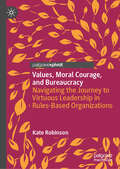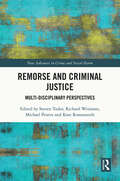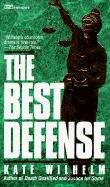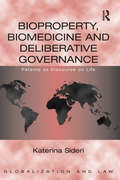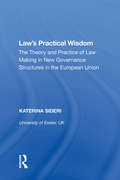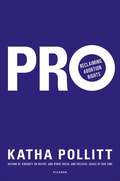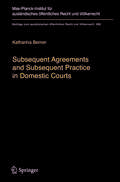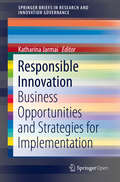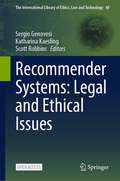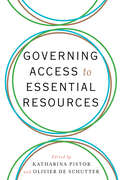- Table View
- List View
The Spirits and the Law: Vodou and Power in Haiti
by Kate RamseyVodou has often served as a scapegoat for Haiti’s problems, from political upheavals to natural disasters. This tradition of scapegoating stretches back to the nation’s founding and forms part of a contest over the legitimacy of the religion, both beyond and within Haiti’s borders. The Spirits and the Law examines that vexed history, asking why, from 1835 to 1987, Haiti banned many popular ritual practices. To find out, Kate Ramsey begins with the Haitian Revolution and its aftermath. Fearful of an independent black nation inspiring similar revolts, the United States, France, and the rest of Europe ostracized Haiti. Successive Haitian governments, seeking to counter the image of Haiti as primitive as well as contain popular organization and leadership, outlawed “spells” and, later, “superstitious practices. ” While not often strictly enforced, these laws were at times the basis for attacks on Vodou by the Haitian state, the Catholic Church, and occupying U. S. forces. Beyond such offensives, Ramsey argues that in prohibiting practices considered essential for maintaining relations with the spirits, anti-Vodou laws reinforced the political marginalization, social stigmatization, and economic exploitation of the Haitian majority. At the same time, she examines the ways communities across Haiti evaded, subverted, redirected, and shaped enforcement of the laws. Analyzing the long genealogy of anti-Vodou rhetoric, Ramsey thoroughly dissects claims that the religion has impeded Haiti’s development.
Values, Moral Courage, and Bureaucracy: Navigating the Journey to Virtuous Leadership in Rules-Based Organizations
by Kate RobinsonThis book focuses on understanding values-based leadership in rules-based organizations. It assists leaders, whether they are Board Members, CEOs, Executives, or Middle to Lower Management, in understanding how to enact and embody values/virtues-based leadership. Of particular interest to readers are the discussions around primary data collected from participants at three levels of leadership in the military who responded to a vignette and interview. The results of the case study are used in conjunction with current trends or practices that are considered unethical and questionable behavior which undermine trust and integrity in organizations. By using a case study from the military, the highly codified rules-based organization illustrates the tensions, contradictions, and paradoxes that leaders face and provide a teachable moment for leaders in all industries the complexities in achieving virtue eudaimonia. In doing so, the book also illustrates the tension and complexities between an individual’s multiple subject positions, organizational rules and values, and the ability to have agency.
Remorse and Criminal Justice: Multi-Disciplinary Perspectives (New Advances in Crime and Social Harm)
by Richard Weisman Michael Proeve Steven Tudor Kate RossmanithThis multidisciplinary collection brings together original contributions to present the best of current thinking about the nature and place of remorse in the context of criminal justice. Despite the wide-spread and long-standing nature of interest in offender remorse, the topic has until recently been peripheral in academic studies. The authors are scholars from North America, the UK, Europe, South Africa and Australia, from diverse academic disciplines. They reflect on the role of remorse in law, for better or for worse, on how expressions of remorse are affected by the legal contexts in which they arise, and on the impact of these expressions on the individual, the court, and the community. The work is divided into four parts – Part I Judging Remorse addresses issues concerning the task of assessing remorse in the courtroom, usually prior to determining sentence. Part II Remorse Beyond the Courtroom explores the place and significance of remorse in various post-court settings. Part III Remorse, War and Social Trauma addresses remorse in the context of political violence and social trauma in the former Yugoslavia and South Africa. Finally, Part IV Reflections seeks to underscore the multidisciplinary and interdisciplinary nature of the collection as a whole, through personal and disciplinary reflections on remorse. The work provides a showcase for how diverse academic disciplines can be brought together through a focus on a common topic. As such, the collection will become a standard reference work for further research across a range of disciplines and promote inter-disciplinary dialogue.
Law, Drugs and the Making of Addiction: Just Habits
by Kate SeearThis book considers how largely accepted ‘legal truths’ about drugs and addiction are made and sustained through practices of lawyering. Lawyers play a vital and largely underappreciated role in constituting legal certainties about substances and ‘addiction’, including links between alcohol and other drugs, and phenomena such as family violence. Such practices exacerbate, sustain and stabilise ‘addicted’ realities, with a range of implications – many of them seemingly unjust – for people who use alcohol and other drugs. This book explores these issues, drawing upon data collected for a major international study on alcohol and other drugs in the law, including interviews with lawyers, magistrates and judges; analyses of case law; and legislation. Focussing on an array of legal practices, including processes of law-making, human rights deliberations, advocacy and negotiation strategies, and the sentencing of offenders, and buttressed by overarching analyses of the ethics and politics of such practices, the book looks at how alcohol and other drug ‘addiction’ emerges and is concretised through the everyday work lawyers and decision makers do. Foregrounding ‘practices’, the book also shows that law is more fragile than we might assume. It concludes by presenting a blueprint for how lawyers can rethink their advocacy practices in light of this fragility and the opportunities it presents for remaking law and the subjects and objects shaped by it. This ground-breaking book will be of interest not only to those studying and working within the field of alcohol and drug addiction but also to lawyers and judges practising in this area and to scholars in a range of disciplines, including law, science and technology studies, sociology, gender studies and cultural studies
Clear and Convincing Proof
by Kate WilhelmThe Kelso/McIvey rehab center is a place of hope and healing for its patients--and for the dedicated staff who volunteer there. But David McIvey, a brilliant surgeon whose ego rivals his skill with a scalpel, wants to change all that. His plan to close the clinic and replace it with a massive new surgery center--with himself at the helm--means that the rehab center will be forced to close its doors.Since he is poised to desecrate the dreams of so many, it's not surprising to anyone, especially Oregon lawyer Barbara Holloway, that somebody dares to stop him in cold blood. When David McIvey is murdered outside the clinic's doors early one morning, Barbara once again uses her razor-sharp instincts and take-no-prisoners attitude to create a defense for the two members of the clinic who stand accused. And in her most perplexing case yet, Barbara is forced to explore the darkest places where people can hide--the soul beneath the skin.
Death Qualified: A Mystery of Chaos
by Kate WilhelmWhat's the link between a powerful mind-altering computer program and two murders in the Oregon woods? Seven years ago Lucas Kendricks deserted his young family and took off for mathematician Emil Frobisher's research project in Colorado. Now, after one day's warning--he ordered a monster computer to be sent to his old address--he's back, and then, moments later, he's dead, along with a young woman he gave a lift to only a few hours before. The police think Lucas raped and killed the hitchhiker and was shot down by his tiny, sharpshooting wife Nell; but defense attorney Barbara Holloway, needled by her estranged father into coming back to him and the law (she'd been on the run from both for five years after a dose of professional disillusionment) is convinced that Lucas's death had more to do with the mysterious men who followed him from Colorado. Taking on her share of cliches--alliance with her curmudgeonly, reluctantly supportive father; opposition from prosecutor/former lover Tony DeAngelo; romance with mathematician Mike Dinesen (whom she's called in to make sense of the connections Lucas had with Frobisher, psychiatrist Ruth Brandywine, and computer expert Walter Schumaker)--Barbara delves into those blank seven years, and comes up with answers that are even scarier than the questions: a set of the most user-unfriendly computer disks in literature.
Heaven is High (A Barbara Holloway Novel)
by Kate WilhelmBarbara Holloway is a low-key attorney in Eugene, Oregon who left her father's high powered firm to handle small legal problems for local residents and ponder her own next move. But while trying to sort out her own future, two people, desperate for help, show up on her doorstep: former pro football player Martin Owens and his wife Binnie. Binnie, who is mute, met her husband when she snuck aboard his boat while it was docked in Haiti and smuggled herself into the U. S. Now Immigration is seeking to deport her back to Haiti, which would be a death sentence. Born to a woman from Belize who was kidnapped and enslaved by pirates, Binnie's only hope is to prove her and her mother's real identity. With only days to find the truth and protect Binnie, Holloway sets off for Belize. But what she knows is only the tip of the iceberg in what turns out to be one of her most complex, compelling and dangerous cases yet.
The Best Defense
by Kate WilhelmAttorney Barbara Holloway has given up on her father's dream for her to become a successful lawyer. The deaths of both Barbara's mother and her lover have deeply affected her, and now she lives on the tiny salary she makes helping the poor who can't pay for "real" legal services. When Lucille Reiner first asks Barbara to help her sister, Barbara has no idea that Lucille's sister is Paula Kemmerman, dubbed the "Baby Killer" by the press after her six-year-old daughter was burned to death, allegedly by a temporarily deranged Paula. The more Barbara investigates, the more certain she becomes that Paula is the innocent victim both of a right-wing fundamentalist with an ax to grind and of a legal system that has turned its back on an innocent woman.
The Unbidden Truth
by Kate WilhelmOregon lawyer Barbara Holloway has a reputation for taking on the most difficult cases--and winning them. But even she can't begin to anticipate the bizarre twists waiting ahead.The large retainer offered by a client who asks for complete anonymity is not the only thing that intrigues Barbara Holloway. The defendant, Carol Fredricks, is a gifted young pianist charged with killing the manager of a piano bar. But Carol is as much of a mystery as the details of the murder for which she is accused. She can't remember anything about her life before the age of eight, and she has been having haunting nightmares about a woman she cannot identify.Before long Barbara becomes convinced that her client is not only innocent, but is being framed by an enemy who will stop at nothing to keep the past buried. And as she unravels the stunning trail of deception, hatred and a remarkable abiding love that holds the key to the mystery of Carol Fredricks, Barbara discovers that the unbidden truth may just damn them both.
Regulating Private Military Companies: Conflicts of Law, History and Governance
by Katerina GalaiThis work examines the ability of existing and evolving PMC regulation to adequately control private force, and it challenges the capacity of international law to deliver accountability in the event of private military company (PMC) misconduct. From medieval to early modern history, private soldiers dominated the military realm and were fundamental to the waging of wars until the rise of a national citizen army. Today, PMCs are again a significant force, performing various security, logistics, and strategy functions across the world. Unlike mercenaries or any other form of irregular force, PMCs acquired a corporate legal personality, a legitimising status that alters the governance model of today. Drawing on historical examples of different forms of governance, the relationship between neoliberal states and private military companies is conceptualised here as a form of a ‘shared governance'. It reflects states’ reliance on PMCs relinquishing a degree of their power and transferring certain functions to the private sector. As non-state actors grow in authority, wielding power, and making claims to legitimacy through self-regulation, other sources of law also become imaginable and relevant to enact regulation and invoke responsibility.
Bioproperty, Biomedicine and Deliberative Governance: Patents as Discourse on Life (Globalization And Law Ser.)
by Katerina SideriBiomedical patents have been the subject of heated debate. Regulatory agencies such as the European Patent Office make small decisions with big implications, which escape scrutiny and revision, when they decide who has access to expensive diagnostic tests, whether human embryonic stem cells can be traded in markets, and under what circumstances human health is more important than animal welfare. Moreover, the administration of the Trade Related Aspects of Intellectual Property Rights by the World Trade Organization has raised considerable disquiet as it has arguably created grave health inequities. Those doubting the merits of the one size fits all approach ask whether priority should be given to serving the present needs of populations in dire need of medication or to promoting global innovation. The book looks in detail into the legal issues and ethical debates to ask the following three main questions: First, what are the ideas, goals, and broader ethical visions that underpin questions of governance and the legal reasoning employed by administrative agencies? Second, how can we democratize the decision making process of technocratic institutions such as the European Patent Office? Finally, how can we make the global intellectual property system more equitable? In answering these questions the book seeks to contribute to our understanding of the role and function of regulatory agencies in the regulation of the bioeconomy, explains the process of interpretation of legal norms, and proposes ways to rethink the reform of the patent system through the lens of legitimacy.
Law's Practical Wisdom: The Theory and Practice of Law Making in New Governance Structures in the European Union
by Katerina SideriThis book develops a sociological understanding of law making in the European Union. In particular, the book focuses on the social function of law in new governance structures promoting decentralized and flexible procedures that encourage deliberation, participation of stakeholders, and public dialogue. It pays attention to both the practical knowledge and the power relations underpinning law making, while seeking to bring to the foreground the importance of compromise in the process. The empirical substantiation of the argument discusses the regulation of technology in the European Union and is premised on case studies of governance of the Internet, patents of high technology, filters used on the Internet to block harmful material, trademark law and domain name dispute resolution by ICANN. To this effect, the book studies the dynamics of constructing a legal argument inside the European Commission, and its role in the process of coordinating the creation of networks, securing enforcement in self regulatory regimes, and steering activity on the part of autonomous groups of actors.
Perspectives on Justice, Indigeneity, Gender, and Security in Human Rights Research
by Katerina Standish Laura E. ReimerThis book is a compendium of emergent global Human Rights Scholarship offering current ruminations on justice, indigeneity, gender, security, and human rights. This edited collection examines Access to Justice, Allyship and Equality, Human Rights and Social Justice, the Rights of Indigenous People, Indigenous Rights and the University, Transgender Healthcare, Femicide, Women Workers, Extremism and Misogyny, Human Rights and Aging, cyberwarfare, climate change.
Pro: Reclaiming Abortion Rights
by Katha PollittA powerful argument for abortion as a moral right and social good by a noted feminist and longtime columnist for the nation. Forty years after the landmark Roe v. Wade ruling, "abortion" is still a word that is said with outright hostility by many, despite the fact that one in three American women will have terminated at least one pregnancy by menopause. Even those who support a woman's right to an abortion often qualify their support by saying abortion is a "bad thing," an "agonizing decision," making the medical procedure so remote and radioactive that it takes it out of the world of the everyday, turning an act that is normal and necessary into something shameful and secretive. Meanwhile, with each passing day, the rights upheld by the Supreme Court are being systematically eroded by state laws designed to end abortion outright. In this urgent, controversial book, Katha Pollitt reframes abortion as a common part of a woman's reproductive life, one that should be accepted as a moral right with positive social implications. In Pro, Pollitt takes on the personhood argument, reaffirms the priority of a woman's life and health, and discusses why terminating a pregnancy can be a force for good for women, families, and society. It is time, Pollitt argues, that we reclaim the lives and the rights of women and mothers.
Natur als Rechtssubjekt: Die neuseeländische Rechtsetzung als Vorbild für Deutschland
by Katharina Bader-PlabstDas Buch analysiert die Möglichkeit der Normierung eigener Rechte der Natur in der deutschen Rechtsordnung. Als Inspiration hierzu wird der Vergleich zur Eigenrechtsgesetzgebung in Neuseeland gezogen. Neuseeland normierte als eines der ersten Länder der Welt eigene Rechte der Natur, indem das Land den Te Urewera Wald und den Whanganui Fluss als Rechtssubjekte gesetzlich anerkannte. Die Gesetzgebung wurde weltweit als umweltrechtliche Pionierleistung gefeiert. In Zeiten der Klima- und Biodiversitätskrise liegt daher der Gedanke nahe, auch im deutschen Rechtssystem über die rechtliche Aufwertung der Natur nachzudenken. Die Arbeit befasst sich daher mit der Frage, ob Rechte der Natur nach neuseeländischem Vorbild in Deutschland sowohl rechtlich zulässig als auch geboten und erforderlich sind.
Subsequent Agreements and Subsequent Practice in Domestic Courts
by Katharina BernerThe book analyses how subsequent agreements and subsequent practice as defined in articles 31 and 32 of the 1969 Vienna Convention on the Law of Treaties have been applied in interpretative reality. Based on the jurisprudence of domestic courts, it elucidates the distribution of power between the parties to a treaty and other actors. To start with, the book traces the origins of subsequent agreements and subsequent practice and places them in their broader legal context. Next, it explores the legal status and effects of subsequent agreements and subsequent practice, explains why such agreements are only rarely used, and defines the relevance of non-party practice in the interpretative process. In closing, it critically examines how domestic courts have approached the normative heart of subsequent practice, i. e. the notion of 'agreement'. Thus, this book ultimately challenges the traditional assumption that the parties are the joint masters of the treaty.
Responsible Innovation: Business Opportunities and Strategies for Implementation (SpringerBriefs in Research and Innovation Governance)
by Katharina JarmaiThis Open Access book, Responsible innovation provides benefits for society, for instance more sustainable products, more engagement with consumers and less anxiety about emerging technologies. As a governance tool it is mostly driven by research funders, including the European Commission, under the term “responsible research and innovation” (RRI). To achieve uptake in private industry is a challenge. This book provides successful case studies for the implementation of responsible innovation in businesses. The importance of social innovations is emphasized as a link between benefits for society and profits for businesses, especially SMEs. For corporate industry it is shown how responsible innovation can offer a competitive advantage to adopters. The book is based on the latest insights from theory and practice and combines conceptual work with first-hand experience. It is of interest to innovation managers, entrepreneurs and academics. For academics, the book will provide a combination of analysis and discussion, and present recent learnings from first-hand interaction with entrepreneurs. For innovation managers and entrepreneurs, it will provide inspiration and better ideas about what responsible innovation can look like in practice, why others have “done it” and what the potential benefits might be. The book will thus serve the purposes of spreading the word about the responsible innovation concept among different audiences whilst making it more accessible to innovation managers and entrepreneurs.
Families and New Media: Comparative Perspectives on Digital Transformations in Law and Society (Juridicum – Schriften zum Medien-, Informations- und Datenrecht)
by Louisa Specht-Riemenschneider Nina Dethloff Katharina KaeslingThe open access edited volume addresses children’s rights and their ability to act in the digital world. The focus is on the position of children as subjects with their own rights and developing capacities. Their consideration by parents, courts and legislators is critically examined. Aspects of digital parenting, especially educational practices and strategies in the context of social media, are analyzed with regard to the tension between protection and participation of children. The edited volume brings debates on privacy and data protection together with those from tort, family and intellectual property law, while also examining the role of families and children in the regulation of data and digital economies, especially online platforms. Legal reflections from Germany, Israel, Portugal and the United States of America are complemented by perspectives from media studies, political science, educational science and sociology of law.
Recommender Systems: Legal and Ethical Issues (The International Library of Ethics, Law and Technology #40)
by Scott Robbins Katharina Kaesling Sergio GenovesiThis open access contributed volume examines the ethical and legal foundations of (future) policies on recommender systems and offers a transdisciplinary approach to tackle important issues related to their development, use and integration into online eco-systems. This volume scrutinizes the values driving automated recommendations - what is important for an individual receiving the recommendation, the company on which that platform was received, and society at large might diverge. The volume addresses concerns about manipulation of individuals and risks for personal autonomy. From a legal perspective, the volume offers a much-needed evaluation of regulatory needs and lawmakers’ answers in various legal disciplines. The focus is on European Union measures of platform regulation, consumer protection and anti-discrimination law. The volume will be of particular interest to the community of legal scholars dealing with platform regulation and algorithmic decision making. By including specific use cases, the volume also exposes pitfalls associated with current models of regulation. Beyond the juxtaposition of purely ethical and legal perspectives, the volume contains truly interdisciplinary work on various aspects of recommender systems.
Opferorientierung im Strafvollzug: Eine rechtsdogmatische Untersuchung zur Auslegung opferbezogener Vorschriften im deutschen Strafvollzugsrecht
by Katharina Marianne RadkeBereits seit den 1980er Jahren wurde eine Einbeziehung des Straftatopfers und seiner Belange in das deutsche Strafvollzugsrecht diskutiert. Im Strafvollzugsgesetz des Bundes spielte die Opferorientierung gleichwohl eine untergeordnete Rolle. Erst mit den nach der Föderalismusreform von 2006 erlassenen Landesstrafvollzugsgesetzen wurde die Opferorientierung umfangreich in das Strafvollzugsrecht einbezogen. Durch die Berücksichtigung von Opferinteressen bei der Ausgestaltung des Vollzugs der Freiheitsstrafe ergeben sich eine Vielzahl neuer strafvollzugsrechtlicher Fragestellungen. Diese betreffen beispielsweise die Vereinbarkeit von Opferorientierung und Resozialisierung, den Schutz von Opfern vor inhaftierten Täter*innen und die Möglichkeiten von Wiedergutmachung und Tatausgleich während der Inhaftierung. In diesem Buch werden die Hintergründe der Opferorientierung des Strafvollzugsrechts untersucht und so Maßstäbe zur Auslegung der opferorientierten Vorschriften der Landesstrafvollzugsgesetze entwickelt. Bei der Auslegung der opferorientierten Strafvollzugsvorschriften werden alle 16 Landesstrafvollzugsgesetze einbezogen. Dadurch wird versucht, zahlreiche Fragen zu beantworten, die sich durch die Berücksichtigung des Opfers und seiner Interessen innerhalb der Landesstrafvollzugsgesetze stellen.
Governing Access to Essential Resources
by Olivier De Schutter Katharina PistorEssential resources do more than satisfy people's needs. They ensure a dignified existence. Since the competition for essential resources, particularly fresh water and arable land, is increasing, and standard legal institutions, such as property rights and national border controls, are strangling access to resources for some while delivering prosperity to others, many are searching for ways to ensure their fair distribution. This book argues that essential resources ought to be governed by a combination of Voice and Reflexivity. Voice is the ability of social groups to choose the rules by which they are governed. Reflexivity is the opportunity to question one's own preferences in light of competing claims and to accommodate them in a collective learning process. Having investigated the allocation of essential resources in places as varied as Cambodia, China, India, Kenya, Laos, Morocco, Nepal, the arid American West, and peri-urban areas in West Africa, the contributors to this volume largely concur with the viability of this policy and normative framework. Drawing on their expertise in law, environmental studies, anthropology, history, political science, and economics, they weigh the potential of Voice and Reflexivity against such alternatives as the pricing mechanism, property rights, common resource management, political might, or brute force.
The Code of Capital: How the Law Creates Wealth and Inequality
by Katharina PistorA compelling explanation of how the law shapes the distribution of wealthCapital is the defining feature of modern economies, yet most people have no idea where it actually comes from. What is it, exactly, that transforms mere wealth into an asset that automatically creates more wealth? The Code of Capital explains how capital is created behind closed doors in the offices of private attorneys, and why this little-known fact is one of the biggest reasons for the widening wealth gap between the holders of capital and everybody else.In this revealing book, Katharina Pistor argues that the law selectively “codes” certain assets, endowing them with the capacity to protect and produce private wealth. With the right legal coding, any object, claim, or idea can be turned into capital—and lawyers are the keepers of the code. Pistor describes how they pick and choose among different legal systems and legal devices for the ones that best serve their clients’ needs, and how techniques that were first perfected centuries ago to code landholdings as capital are being used today to code stocks, bonds, ideas, and even expectations—assets that exist only in law.A powerful new way of thinking about one of the most pernicious problems of our time, The Code of Capital explores the different ways that debt, complex financial products, and other assets are coded to give financial advantage to their holders. This provocative book paints a troubling portrait of the pervasive global nature of the code, the people who shape it, and the governments that enforce it.
Recht und Ethik der Risikoregulierung in der Grünen Gentechnik: Das Vorsorgeprinzip in der Rechtssache C-528/16 Confédération Paysanne
by Katharina SchreiberDieses Buch beschäftigt sich mit hochaktuellen und grundlegenden rechtlichen und rechtsethischen Fragen der Regulierung der modernen Biotechnologie, insbesondere von genetisch veränderten Organismen. Zentraler Gegenstand der Arbeit ist die Rechtssache Confédération Paysanne des EuGH, in der die Anwendung des Vorsorgeprinzips im europäischen Gentechnikrecht gestärkt wurde. Dies wurde von naturwissenschaftlicher Seite als gegenwärtig nicht angemessen und veraltet kritisiert. Das Vorsorgeprinzip, verankert im europäischen Umweltrecht und in verschiedenen Verträgen des internationalen Rechts, ist vor allem bei der Regulierung von Biotechnologie umstritten. Es geht daher in diesem Buch um Fragen der angemessenen und ethisch fundierten Regulierung von Teilbereichen der Biotechnologie als einer Zukunftstechnologie. Dies geschieht vor der anhaltenden Debatte um eine mögliche Neuausrichtung des europäischen Biotechnologierechts. Die theoretischen und dogmatischen Grundlagen für die gegenwärtige und zukünftige Normierung werden dargelegt.
Nachhaltigkeit und Digitalisierung – (k)ein unternehmerisches Dilemma: Zukunftsbilder und Impulsberichte
by Katharina SiglDieses Fachbuch, ausgezeichnet mit dem Austrian SDG-Award 2021 in der Kategorie Medien, wirft einen konstruktiv kritischen Blick auf die zwei großen Themen unserer Zeit: Digitalisierung und Nachhaltigkeit. Die strategischen und operativen Einsatzfelder der Digitalisierung wachsen ebenso wie der Anspruch auf eine nachhaltige Wirtschaft, welcher auf die Forderungen der 17 Sustainable Development Goals (SDGs) zurückzuführen ist. Eine gemeinsame Betrachtungsweise ist unumgänglich und gegensätzliche Ansprüche müssen überdacht werden. Namhafte und engagierte Expert*innen zeigen, dass nachhaltiges Wirtschaften und Digitalisierung keine Gegenpole sein müssen. Geschrieben für Menschen, die sich ihrer unternehmerischen, ökologischen und sozialen Verantwortung bewusst sind und nach Impulsen für eine erfolgreiche Umsetzung suchen. Dazu bieten die Autor*innen aus Wissenschaft, Institutionen und Wirtschaft neue Perspektiven auf die großen Zukunftsfelder Arbeit, Bauen, Berufliche Bildung, Energie, Gesundheit, Industrie, Kommunikation, Konsum, Kunst & Kultur, Landwirtschaft, Mobilität und Tourismus.

